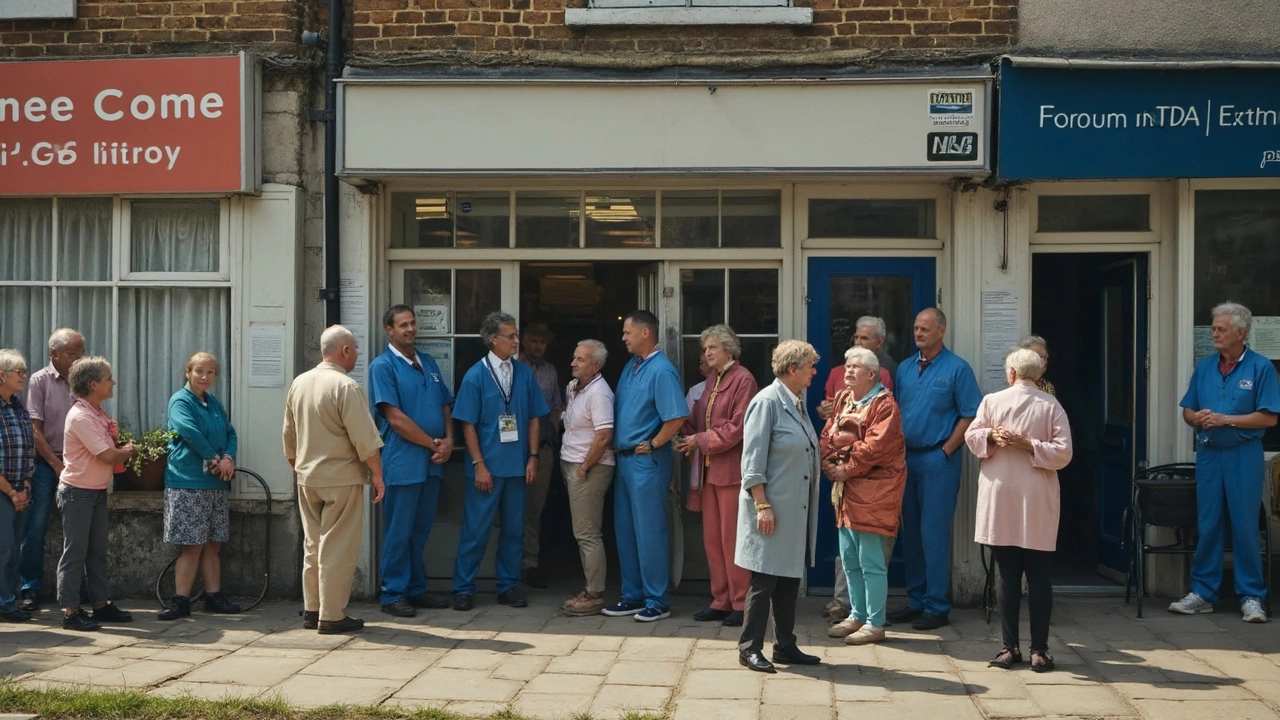People outside the UK often picture the NHS as a magical system where you never pay a penny for anything. The reality? It’s a bit of a mix. Yes, most core NHS treatment is free at the point of use—so you’re not getting slapped with a bill after your GP appointment or hospital stay. But you might still end up reaching for your wallet, sometimes when you least expect it.
For starters, prescriptions aren’t usually free if you’re in England and over 16, unless you qualify for certain exemptions. Same goes for dental care and eye tests—most adults need to pay, and the charges can surprise you if you’re new to the UK. Even a routine dentist visit or a pair of glasses comes out of your own pocket, unless you’re in Scotland or Wales, where rules are a bit different.
And then there’s the question of extra costs for visitors or people moving to the UK—think the immigration health surcharge or upfront charges for those who aren’t ’ordinarily resident.’ It’s easy to get caught out if you just assume “free healthcare” means totally free, with no small print.
- What NHS Really Covers for Free
- The Hidden Costs of UK Healthcare
- NHS and Private Insurance: What’s the Difference?
- Tips for Navigating Healthcare Costs
What NHS Really Covers for Free
The big selling point of the NHS is that you can see a doctor or go to hospital without worrying about the bill. If you’re a UK resident, core NHS treatment covers things like:
- Appointments with your GP (family doctor)
- Visits to specialists when your GP refers you
- Emergency medical treatment in A&E (Accident & Emergency)
- Surgery and follow-up care when it’s needed for your health
- Maternity care from pregnancy to birth and beyond
- Help managing long-term conditions like diabetes or asthma
In other words, if it’s about keeping you healthy or treating you when you’re sick, you usually won’t pay out of pocket on the day. There’s no charge for ambulance rides in emergencies, either. The whole idea is that the NHS is publicly funded—mainly through taxes—so everyone chips in, whether they’re healthy or sick.
Here’s the flip side: ‘free’ actually depends on a few details. You need to be registered with an NHS GP and you normally have to live in the UK—to be what’s called ‘ordinarily resident.’ Tourists and short-term visitors don’t get the same deal and may have to pay for care unless it’s a real emergency.
Some extras, like prescriptions, dental care, and eye exams for adults, are where most people start seeing charges pop up. But children under 16, students under 19 in full-time education, and people on certain benefits can get these free as well. If you live in Scotland, Wales, or Northern Ireland, you get free prescriptions. In England, the flat-rate per prescription applies, unless you’re exempt.
Take a look at the numbers for a better feel:
| Service | Cost for Most Adults in England | Free For |
|---|---|---|
| GP Appointment | £0 | Everyone registered with an NHS GP |
| A&E Visit | £0 | Everyone in emergency |
| Hospital Stay | £0 | Those 'ordinarily resident' |
| Prescription | £9.90 per item (2025) | Under 16s, 16-18 in full-time education, pensioners, exempt groups |
| Dental Check-up | £26.80 (Band 1) | Under 18s, pregnant women, exempt groups |
| Eye Test | £0-£25 | Under 16s, over 60s, those with certain medical needs |
So, the next time someone says UK healthcare is totally free, you’ll know there’s more to the story. The basics are covered by your taxes, but there are exceptions—and knowing where those lines are can save you a nasty surprise.
The Hidden Costs of UK Healthcare
It’s easy to assume everything on the NHS is free, but that’s not how it works in real life. Even though basic treatment covers a lot, you can still end up paying for several pretty common services. Most adults see these costs at some point—so it’s better to know what you’re getting into ahead of time.
Let’s start with prescriptions. In England, a single prescription costs £9.90 as of April 2024. That’s per item, not per visit—so if you’re on multiple medications, costs add up fast. In Scotland, Wales, and Northern Ireland? Prescriptions are free for everyone. If you have a long-term condition or low income, you might qualify for an exemption, but you have to apply for it—nothing automatic.
Dental care on the NHS is rarely free for adults. There are three standard charge bands in England. Here’s a quick breakdown:
| Dental Band | Service | Cost (2024) |
|---|---|---|
| Band 1 | Check-up, diagnosis, advice | £26.80 |
| Band 2 | Fillings, root canal, extractions | £73.50 |
| Band 3 | Complex treatments (crowns, dentures) | £319.10 |
Same situation with eye care. If you’re an adult, an NHS eye test costs around £25–£35, and you’ll pay full price for glasses or contact lenses unless you’re under 16, in full-time education, or qualify for certain benefits.
Hospital parking adds another surprise cost, especially in England. Parking charges vary but can be as much as £20 for a longer hospital visit. Scotland and Wales scrapped most parking fees, but some private hospital lots still charge.
- Non-emergency ambulances aren’t always free—some areas charge if it’s not medically necessary.
- Medical reports and letters (for work, visa, or school) can cost anywhere from £10 to £50.
- Travel vaccinations often aren’t covered—expect to pay for anything beyond standard immunizations.
If you’re visiting the UK or moving here, there’s the Immigration Health Surcharge, currently £1,035 per year for most adults on work or student visas. Without it, expect to pay full price for NHS care unless you’re from a country with a reciprocal deal.
The bottom line: yes, treatment is free at the point of need for many things, but those small (and sometimes large) charges quickly add up. You definitely want to budget for them—whether you’re living here or just staying a while.

NHS and Private Insurance: What’s the Difference?
The main difference comes down to access and extras. The NHS is the UK’s state-run health service. It covers things like GP visits, hospital care, ambulance rides, and emergency treatment for anyone living in the UK. For most people, this is all they ever use. But what the NHS won’t usually give you is more choice or faster treatment, especially for non-emergency stuff. That’s where private health insurance steps in.
Private insurance costs money, but some people go for it to dodge NHS waiting lists or get treated in private hospitals. With private cover, you pick the hospital or specialist (within the insurer’s network), often get a private room, and in some cases, shorter waits for things like operations or mental health support. But loads of treatments are still not covered—for example, emergency care and pre-existing conditions are often excluded. Also, even with private insurance, you’ll still use the NHS for a lot of things!
Here’s a quick side-by-side to spell out the contrasts:
| Feature | NHS | Private Insurance |
|---|---|---|
| Cost to Use | Usually free for UK residents | Monthly premiums, plus possible excess fees |
| Choice of Doctor/Hospital | Limited (assigned by area, little choice) | Greater choice within provider network |
| Waiting Times | Can be long for non-urgent cases | Usually shorter for covered treatments |
| Private Rooms | Rare—mostly shared wards | Often included |
| Emergency Care | Fully covered | Usually not covered |
| Specialist Referrals | Need GP referral, can wait | Often quicker access |
Why do some go private even with the NHS around? The numbers tell the story: as of 2023, about 12% of UK residents had some sort of private health insurance. But the UK healthcare system still relies mostly on the NHS.
If you’re thinking of private insurance, don’t assume it’s a fix-all. Always check what’s covered, and figure out if faster access is really worth the cost. For some, the peace of mind is worth it. For most, the NHS covers what they need, especially for serious or emergency care.
Tips for Navigating Healthcare Costs
Getting tripped up by charges in the UK can be frustrating, especially if you’re expecting everything to be free. A few smart moves can really help you get the most out of the NHS and avoid nasty bills.
- Check if you're exempt from charges. The NHS offers free prescriptions, dental, and eye care to certain groups—like kids under 16, people in full-time education up to 18, pregnant women, new parents (up to a year after the birth), and those on low-income benefits. Always check your eligibility, since you might be missing out.
- Buy a prepayment certificate if you use a lot of prescriptions. In England, prescriptions cost £9.90 per item in 2025. But if you get more than one a month, it’s cheaper to buy a PPC (Prescription Prepayment Certificate)—pay once, get unlimited scripts for a set time period. In 2025, that's £31.25 for three months or £111.60 for the year.
- Use NHS dental banding to predict costs. Dental charges are split into three bands. For example, a standard check-up and cleaning costs £26.80 (Band 1). Fillings and extractions are £73.50 (Band 2), while more serious work like crowns is £319.10 (Band 3). That way, you know what costs to expect before seeing the dentist.
- Take advantage of free eye checks (if eligible). In Scotland and Wales, all eye tests are free. In England, under-16s, full-time students up to 18, over-60s, and some people on benefits get free eye tests too. Ask your optician about NHS eligibility.
- If you’re a visitor or new arrival, pay the Immigration Health Surcharge (IHS) or check if you’re covered. As of 2025, the IHS is £1,035 per year for adults. Pay this with your visa application, and you’ll get almost the same NHS access as a resident. If you don’t pay, emergency care is free, but routine stuff is not.
- Private health insurance can help with waiting times and extras. NHS waits for things like knee ops or scans can be long, especially after COVID-19 hit waiting lists hard—over 7.5 million people were waiting in early 2025. Some get private insurance to skip queues or cover extras like physio.
If you want a quick look at common costs in the NHS, here’s a handy table:
| Service | England | Scotland | Wales | Northern Ireland |
|---|---|---|---|---|
| GP Visit | Free | Free | Free | Free |
| Prescription Charge | £9.90/item | Free | Free | Free |
| Dentist (Band 1) | £26.80 | Free for some | Free for some | £23.10 |
| Eye Test | £25+ (unless exempt) | Free | Free | £20-£25 |
| Immigration Health Surcharge | £1,035/year | £1,035/year | £1,035/year | £1,035/year |
The UK healthcare system gives most people access to treatment without upfront costs, but knowing exactly what’s free and what isn’t can save you stress—and sometimes a decent chunk of money too.





